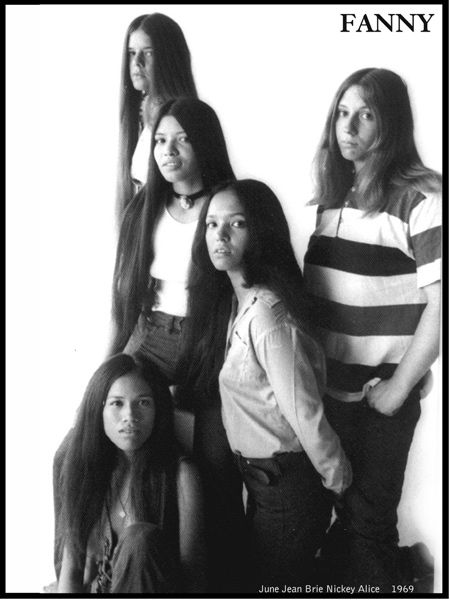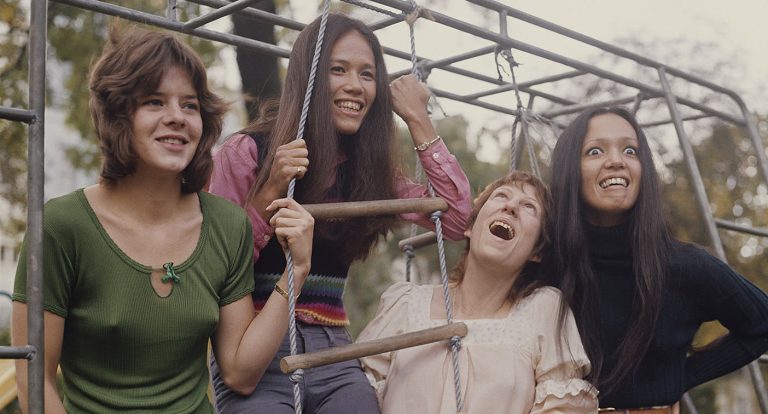Additional Information
Fanny is the unique story of sisters June and Jean Millington, born in Manila to a Filipina mother and an American military father, who ended up in California where they embraced their passion for music, forming small bands with girlfriends and eventually founding Fanny in 1969. The first all-female rock band to release a full-length album on a major label, Fanny was also the first such band to compete musically with their male peers, proving that girls could rock as well as, if not better than, boys—a major influence on bands such as the Runaways, the Bangles and many others.
Between 1970 and 1974, Fanny released five albums before dropping off the radar, just after scoring their biggest hit, “Butter Boy”, a song about David Bowie that peaked at #29 on the Billboard Hot 100 rock chart in 1975. As the Thin White Duke, with whom Jean Millington had a brief affair before marrying his guitarist Earl Slick, put it, “They were extraordinary: they wrote everything, they played like motherfuckers, they were just colossal and wonderful, and nobody’s ever mentioned them. They’re as important as anybody else who’s ever been, ever. It just wasn’t their time.”
But in recent years, it seems that their time has finally come, a rehabilitation and recognition due in large part to all those old concert clips circulating on YouTube, and the digital accessibility of their material, not so easy to find on wax.
The documentary The Right to Rock, which tells the story of the band’s unfinished dream, will be presented at the 20th edition of Pop Montreal. Montreal director Bobbi Jo Hart’s film should help to further build the band’s reputation, and shed light on their little-known journey. “Revivify Fanny. And my work is done,” added Bowie…
As a complement to the screening, the guitarist and co-founder of Fanny, June Millington, will be on hand to present the film, and then join incandescent rockers NOBRO on stage to play some of the key songs of the mythical Californian band, recently reunited under the name Fanny Walked The Earth but unfortunately hindered by the health problems of the Millington sisters.
Recovering well from a battle with cancer, guitarist June Millington recently gave PAN M 360 an interview in which she talks about Fanny’s journey and her involvement with young women musicians through the Institute for the Musical Arts, which she co-founded with her partner in 1986.
PAN M 360: Fanny recently returned to the fold, releasing the album Fanny Walked The Earth in 2018. Following this reunion, to which all former members were invited, there was a notable absence of keyboardist and vocalist Nickey Barclay, who was an important musician in the band at the time.
June Millington: She doesn’t want to be in public. I never really knew her real well, I must say. She doesn’t want to be involved in anything we do so, that’s it. You know, when we played at the Outfest in L.A. a few weeks ago, I didn’t miss her at all. The core part of the music really stands, whether or not Nickey plays. We proved that to my satisfaction. We proved it in LA, just feeling the music as it is. And I really like that. It’s just as powerful, because the songs are really good. The way we play them, there is a certain attack, a certain power.
PAN M 360: Actually, the core of the band was originally Brie Howard [also known as Brie Brandt, Brie Darling and Brie Berry, and also a Filipina-American), Jean and you. Then Brie left and was replaced on the drums by Alice De Buhr. Then Nickey Barclay was added on keyboards and vocals for the release of your first album, Fanny, in 1970. So Nickey wasn’t around when you started.
June Millington: Jean and I started our first band when we were in high school in late ’64, called The Svelts, and both Alice and Brie were in it at different times. Essentially, we learned how to play and we learned how to manage our own equipment before we got to L.A. I always tell people that if you want to understand Fanny, you have to understand The Svelts. The Svelts had it all essentially, no matter who was in it. The Svelts had the core of how we attacked the music. We were really fierce, but we developped that before we got to L.A. and played the Troubadour where we were spotted by producer Richard Perry’s secretary. That’s why we got signed with Richard Perry; you could feel that fierceness, you could feel it getting ready to explode in another way. Then Richard taught us how to record and write songs, and he taught us well. You could hear everything on our records, all our parts. Before that we didn’t know how to record and that’s why there aren’t any real good recordings of The Svelts. Before we got to L.A., our sound was very contained, we were learning the music, we were playing at dances. We weren’t trying to blow people’s minds because it wasn’t the right time for that. But after a while, here I was, jamming with Lowell George and Skunk Baxter and all these masters of sound. We would all play together and develop what is now known as classic rock. Of course others were developing that sound as well, but we were all part of a big piece. By the time 1970 came and we released our own music, a little bit of people opened up to what we were doing, little bit by little bit.

PAN M 360: You mentioned the word fierceness… Would you say that part of that strength comes from the fact that you and your sister, being Filipina-American, had to fight to fit in and be respected when you came to live in the U.S. and had to deal with racism? Perhaps your sexual orientation also gave you that willingness to fight for acceptance at that time?
June Millington: I became aware of my sexual orientation a little bit later, at around 20 years old, I would say. Before that I was way too young and shy to do anything with another woman. That strength, I developed it later, after The Svelts. But I think you can say that this strength that Jean and I have is perhaps unique to all Filipinos; they have an incredible sense of music and they are very talented. But most of all, I think that this strength we had in us, Jean and me, we felt it, it was very strong. We decided to form a band because her boyfriend was playing in a surf band. I let you imagine how far back we go. So we met two other girls who played guitar and we started a band. We must have been 15 or 16 years old. We got gigs but the boys wouldn’t let us play on their instruments, so we managed to get our own gear. Then we had to get shows. The Vietnam war wasn’t so bad for us because it allowed us to play at several Army bases. We played for the soldiers, it was pretty amazing. And then the teen clubs came along. We played a lot of shows there, around 1967. And then shows in junior high schools, high schools, clubs. That’s what made us strong, that was our training, the hard way. And you know what else gives me some of that energy? The smell of Fender tube amps. When I smell that, I get excited, I know it’s gonna happen and it’s going to be loud. I think Jean and I were born to do this.
PAN M 360: You’ve said that after your concerts, girls often came to you to ask you how to form a band. What did you tell them?
June Millington: First, to be very disciplined. If it doesn’t work out one night, if you mess up in a show, you have to have the strength to get back up and keep going. It takes guts and the strength to persevere. You can have a lot of talent but no courage. You have to know how to pick yourself up and keep going and keep learning. You have to rehearse a lot and do a lot of shows. You have to do that. It takes a lot of time and effort. It takes dedication.
PAN M 360: You are very involved with the women’s music movement, you have produced many albums for female musicians, with your partner you operate the Institute for the Musical Arts, a rock camp for young girls and teenagers… In short, you have long been at the forefront of women’s struggles in the music world. Would you say that the situation has evolved a lot for women in the rock and pop genres?
June Millington: Women are much more visible than they used to be, that’s for sure. They are free to create whatever they want, in many different styles. It’s not unusual for a group of women to get visibility. It’s not unusual for a women’s band to be visible. But a women’s band having a string of successes as big as those of men’s bands like the Stones, the Beatles, Led Zeppelin and so many others, that still hasn’t happened as far as I know, and that’s what I’m waiting for. I’m not talking about solo singers like all those R&B divas or pop stars, I’m talking about groups. There have been bands, but they’ve had limited success, there’s been no real consistency, nothing like the giants of rock. Who will make it? I don’t know…
(photo principale: Michael Putland)
























